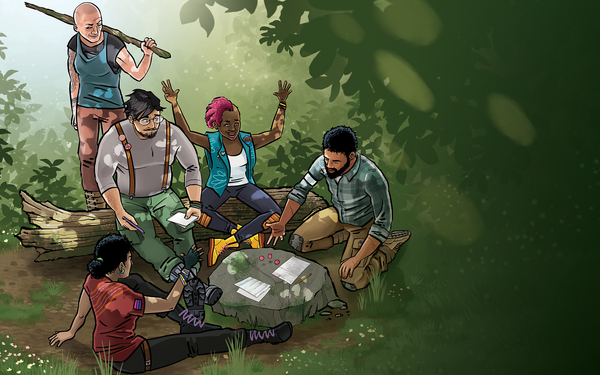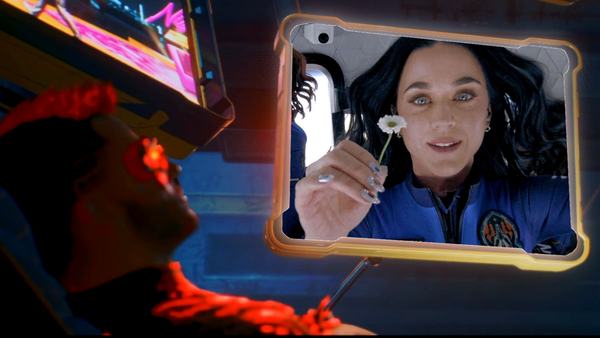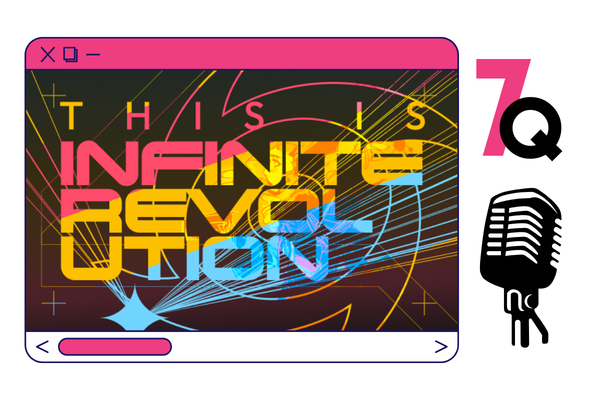Trickle-down Gamenomics
Draft dodgers in the console wars.

Chase and Thomas professionalize the tabletop podcast space one news story at a time on Episode 23 of the Rascal Radio Hour. GAMA makes some serious-sounding moves — including the surprise resignation of executive directory John Stacy — but that includes a not-so-serious "rebranding". Kickstarter workers go on strike. Game designers aren't getting paid by itch.io. An updated Cypher System somehow earns over $1 million. And that's just the first half of the show!
Later on, the pair discuss the joy of oracles, what it means to roleplay revolution, and the importance of good graphic and information design in tabletop games. Chase is depressingly good at video games. Thomas reveals he's a One Piece sicko. Finally, they face off against the Question Dungeon's latest threats: mono-system concerns and the (dubious) threat of Harry Potter entering Magic: The Gathering's Universes Beyond.
You can find Rascal Radio Hour on Apple, Spotify, and all the other various podcatchers. Leaving a five-star review helps new listeners find our show and website. Since we eschew traditional advertising, these reviews and any word-of-mouth are genuinely a massive help — thank you!
Here's an excerpt:
Thomas: So yeah, Shadowrun. I wrote about it last Monday, and it sort of began as a labor story. I think we had seen on Reddit some people complaining, just one person actually, complaining about a late payment on an invoice. I don't think it was actually that late or anything, but once I was there, reading about Shadowrun, I couldn't help but bump into so much conversation where people were just pissed off with the game. And that's not a good place to start, but it did catch my interest. And one of the things we do here is just follow our nose. So yeah, I followed my nose, tried to understand what's the deal with Shadowrun? Why does it have the reputation it has? It became this really interesting story about an anti-corporate game being published in very corporate was and what that meant. I got to speak to some players, I got to speak to some people who worked on the game. Yeah, it pretty cool.
Chase: It's not an exhaustive biography of Shadowrun. It's not one of those like sort of like 40,000 word deep dives. It's a pretty brisk history, but in doing so, you do lay out a really interesting framework for how people have publicly perceived the different generations, the different editions of Shadowrun, through the lens of like, did people love it? Did people hate it? And broadly, why?
You do tend to find that some of these editions were really messy, and people loved the mess. And then they cleaned it up, and people hated that. Or they attempted to clean it up in a certain way and everyone did not like the way that that went down.
Thomas: I mean they never really cleaned it up. That's the thing. I think the publishers are always saying some version of we're trying to streamline it and we're trying to make it better and almost never is that received in a straightforward, uncomplicated way.
Chase: I think, if nothing else, it's a really fascinating look into probably why Wizards of the Coast is so afraid of doing another edition. Because if they court even half of the animus that the Shadowrun community, as niche as it is, puts up with a new edition, yeah, maybe they're right to avoid this.
Thomas: Yeah, edition wars. That's another thing that the piece could have been about. Like, why do edition wars exist? But the problem is, if you're not a part of the edition war, if you're not fighting in the trenches of the edition war, it is the most boring thing ever. Because people are always like, no, the meta currency doesn't work exactly like how I imagined it when I was 12 years old. Or whatever.
Chase: Yeah. It's the same with any of these sort of commercial wars. I got my start in video game journalism. I was reading and writing about the console wars back when that was a thing that mattered, but only insofar as people who cared posted online about it. At the end of the day, they were businesses selling products, and it was never anything more than that.
Thomas: Yeah, it is weird that people even today will talk about consoles as if the people who use them have specific personalities, They're like, you're an Xbox user. I'm like, what does that mean?
Chase: No, these are people who care about their Gamerscores back when that was a thing, you know?
Thomas: Yes! People who want to get to Gamer Heaven and are really worried about it.
Chase: People who thought like, you know, gamers' rights were an important issue for a real political bloc and necessary things.
Thomas: As soon as you say "gamer rights", you mean the fascists. You mean the people who are now straight up wearing skulls.
Chase: Yeah, unfortunately, history has meant when you say gamer, you kind of mean crypto Nazi, you know, like it's kind of what it ended up being.
Thomas: It's so sad because I am a small-G gamer, and I live in fear of capital-G Gamers.





